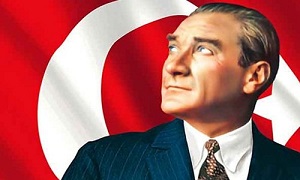Is the Kemalist Project to Blame for Turkey’s Failed Democracy?
By Toni Alaranta
February 17, 2017
It has become a commonplace to argue that Kemalism was a Turkish variant of right-wing nationalism with strong corporatist leanings and even fascist aspects. This is often compounded with the assertion that the Kemalist secularist state elite only sought to secure its own power and status in society, and that it only paid lip-service to Enlightenment ideals. It is pertinent to ask why the Kemalists would have embarked on a hugely unpopular project of culture revolution that threatened their hold on power by provoking a popular reaction, if they only sought to establish a right-wing dictatorship. The right-wing authoritarianism from which Turkey has suffered during most of its history has other sources.

Yaşlı: The Islamic-military alliance
Fatih Yaşlı in Birgün writes that the alliance between the supposed “vanguard of secularism” – the military – and political Islam, which historically was motivated by a shared desire to beat the left, has a long pedigree. The military entered into a pragmatic relationship with the political representatives of religion during the Cold War. One example was when the military after the coup in 1971 asked Necmettin Erbakan to return from his exile in Switzerland to found a new Islamist party. Yet for many years, the Islamists accused – not the military as an institution, but its top echelon – of being alien to the national culture and of being westernized. But this relation has now evolved. There is now a military that the Islamists can much easier embrace; the military is no longer viewed as being alien to “national values,” and is seen as the “army of the nation.” The fight against the PKK has deepened the relationship between Islamism and the military. We have now a “militarist Islam” that has appropriated the army and which is supporting the war. And the military has also changed, and is continuing to change, which presents us with an “Islamic militarism.” It is claimed that the lower echelons of the officers’ corps is becoming dominated by religious officers. It is also claimed that there is a similar process ongoing among the higher echelons, albeit less so. The one area that symbolizes the confluence of “militarist Islam” and “Islamic militarism” is the “national defense industry.” The character of the regime and its political economy was expressed in the fact that the president’s new son-in-law hails from one of the important families of this sector, and was underlined by the fact that the chief of the general staff acted wedding witness. That was a tremendous demonstration of the zeitgeist.
A Political Comeback for the Turkish Military?
By Lars Haugom
March 11, 2016
The Turkish military has no known intention to intervene in the political decision-making process. However, the military has retained a capacity to do so - both by means of its continued role in security policy making and its relative institutional autonomy. The extent of any military involvement in politics will largely depend on how the Kurdish issue is handled by the government. But it is still highly unlikely that any such involvement will take the form of a direct intervention.
Münir: Erdoğan’s order is going to crumble just like Atatürk’s order did
Metin Münir on t24 news site writes that the regime in Turkey is engaged in an attempt to reverse what Atatürk and his friends did when they founded the republic in 1923; they are founding a new republic. It is going to a place where conservatives, the pious and the lumpen rule supreme, and where everyone else is excluded; it is going to be a Sunni and not secular, a Middle Eastern and not European Turkey. If Atatürk and his friends had not emerged when the empire fell, Turkey would have been a mix of Pakistan, Saudi Arabia and Iraq. This fate was averted, but the founders of the republic were unable to create a peaceful regime. That was because they did not accept that Turkey is a mosaic that is made up of Turks and Kurds, of Sunnis and Alevis and of many other religious and ethnic minorities. Instead, they erected a regime ruled by secular Turks. That did not work. The emergence of Erdoğan and his friends is the result of this neglect. Now, they are repeating the same mistake in a different way. They have replaced the rule of the secular Turks with the rule of the Sunni Turks – again by disregarding the Alevis and the Kurds and the seculars who have become the biggest minority. This is not going to work either. It is going to crumble. A new order will eventually be created, but only after we have gone through indescribable miseries and destruction.
A pattern of death: Turkey’s progressives are prey to the Leviathan
By Halil Karaveli
October 16th, 2015, The Turkey Analyst
Turkey’s democrats, leftists and minorities have always been prey to the sinister machinations of the multi-tentacle Leviathan that is in charge of the country. Arrayed against them have been authoritarian right wing governments, the military and the deep state. The Ankara massacre is a reminder of who the victimized “others” in Turkey really are. It is also a reminder that the course of modern Turkish history has more than anything else been shaped by a sustained effort to stamp out any kind of challenge from the left. The deep reservoir of popular, ultraconservative, ultranationalist resentment has continued to yield politically instrumental mass murderers. It has ensured that fascism – whether in Kemalist or Islamic disguise – has always prevailed in Turkey.





